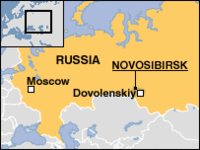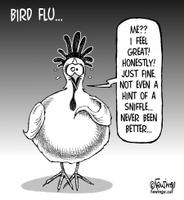HEWITT.MOBI
Tuesday, August 16, 2005
I have been following the progress of the Avian flu outbreak, & came across this, in the Times about a new outbreak in Russia, today. -
Download & Watch the BBC TV report here
The Times
August 16, 2005
Deadly bird flu virus is closing in on Europe
AN OUTBREAK of avian flu among wild and domestic birds in Russia is spreading west and starting to approach Europe, public health officials said yesterday.
The first cases of bird flu have been reported in the Chelyabinsk region of Siberia, close to the Ural mountains that separate Europe from Asia, though scientists are not yet certain that the virus found there is the deadly H5N1 strain.
Roads were cordoned off and hundreds of chickens were slaughtered in Chelyabinsk yesterday to contain the apparent advance of avian flu, first reported in Siberia in July and being spread westward by migrating birds.
Gennadi Onishchenko, Russias top state epidemiologist, also predicted that the outbreak could spread to Russias most important agricultural areas of Krasnodar, Stavropol and Rostov in the south and then on to the Middle East and the Mediterranean.
In a letter to Russian regional health officials, Mr Onishchenko wrote: An analysis of bird migration routes has shown that in autumn 2005 the H5N1 virus may be spread from Western Siberia to the Caspian Sea and the Black Sea. Apart from Russias south, migrating birds may spread the virus to nearby countries (Azerbaijan, Iran, Iraq, Georgia, Ukraine, and Mediterranean countries) because bird migration routes from Siberia also go through those regions in autumn.

The virus is being carried by flocks of birds, particularly wild geese and ducks, migrating from Siberia towards warmer regions. It has moved gradually west through the regions of Novosibirsk, Tyumen, Omsk, Kurgan and Altai, as well as into Mongolia and Kazakhstan. Only in Altai, Novosibirsk and Omsk has the type of avian flu been confirmed as H5N1.
The latest region to be affected, Chelyabinsk, is the westernmost so far, about 600 miles (1,000km) from the first reported outbreak.
Roads leading to the infected village of Oktyabrskoye in Chelyabinsk, where 60 chickens have died, have been cordoned off to prevent the virus spreading. All ill and infected birds are being slaughtered there, the Agriculture Ministry said in a statement.
In other affected regions domestic birds were culled to block the virus that has killed more than 10,000 birds countrywide.
Officials said that wild birds, increasingly active this month as they prepare to migrate before winter, were to blame.
Results of epizootic checks have shown that they (migrant birds) are the main source of infection, Ria-Novosti news agency quoted an official with the Novosibirsk state consumer rights watchdog as saying.
The H5N1 strain of avian flu has led to the death from infection and culling of tens of millions of birds across South-East Asia. It has also infected 112 people in Thailand, Vietnam, Cambodia and Indonesia, causing 57 deaths. Russia has not yet experienced any cases of affected human beings.
Scientists are concerned that the H5N1 strain of avian flu could mutate so that it is passed easily from one person to another. If that were to happen, it would have the potential to trigger a lethal pandemic on the scale of the 1918-19 Spanish flu in which 20 million to 40 million people died.
By Mark Henderson, Science Correspondent

This is worrying, are we seeing the slow spread of this virus from the far east into Europe ?. It seems we are sadly very unprepared for an outbreak in the UK. It would seem that even though scientists are working on a vaccine for this flu, so far the experimental vaccine tried, has been unsuccesful. The only effective treatment is a product called Tamiflu manufactured by Roche.
This is an anti viral drug, orally administered which if given before exposure to Bird flu may give 'some' protection against the virus. The UK government is spending £200 million, on Tamiflu enough to treat 14.6 million people roughly a quarter of the population, in th UK. Whilst this is to be welcomed, the virus will inevitably effect the young, elderly, & those with chronic diseases like HIV etc.
Having seen the most recent terrorist bombings in London & the effect that they had, overwhelming casualty & accident & emergency units in the capital, what would be the effect of a major sustained outbreak of this virus. The outcome looks bleak, some compare the possible outcome with the world wide flu outbreak in 1918 which killed 40 million people. If an outbreak of this magnitude were to occur here it would seem that we are woefully unprepared. We can only hope that that governments all around the world take notice of the dire warnings being given by leading scientists, & start to take the current avian flu outbreak seriously.
Health organistations recommend all people suffering from HIV have flu vaccine regularly every year. Mine are not up to date but you can be sure that they will be very soon !.
Charlie
hewitt.mobi Posted at 10:22 pm |
0 comments
0 Comments:





